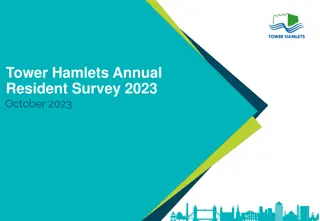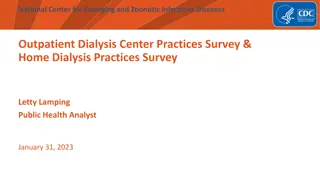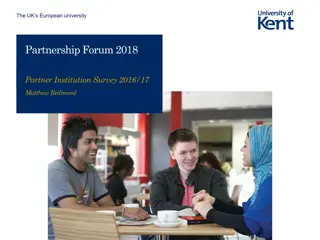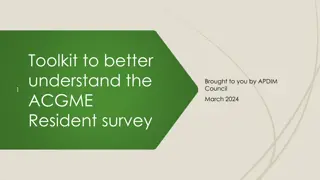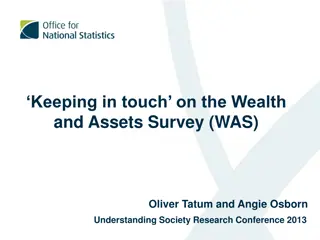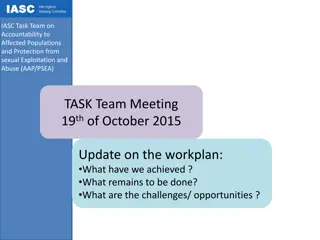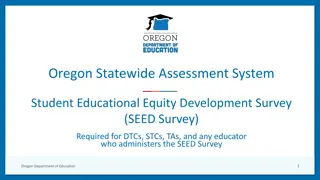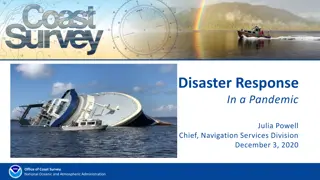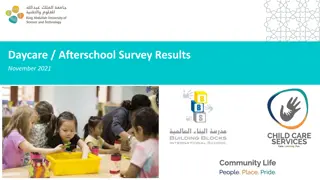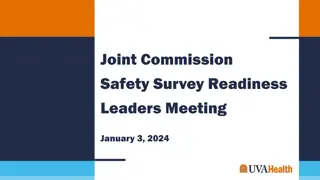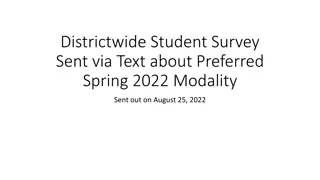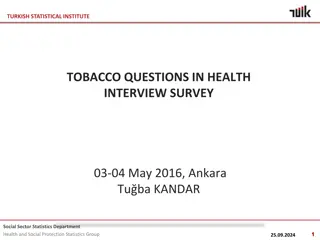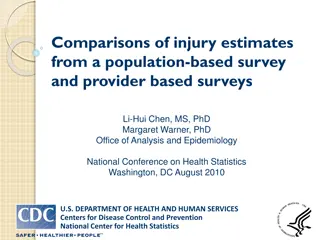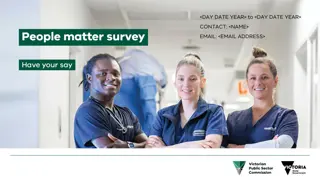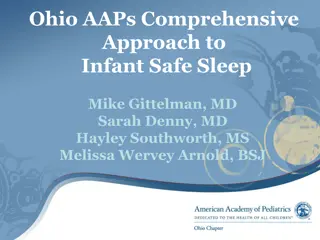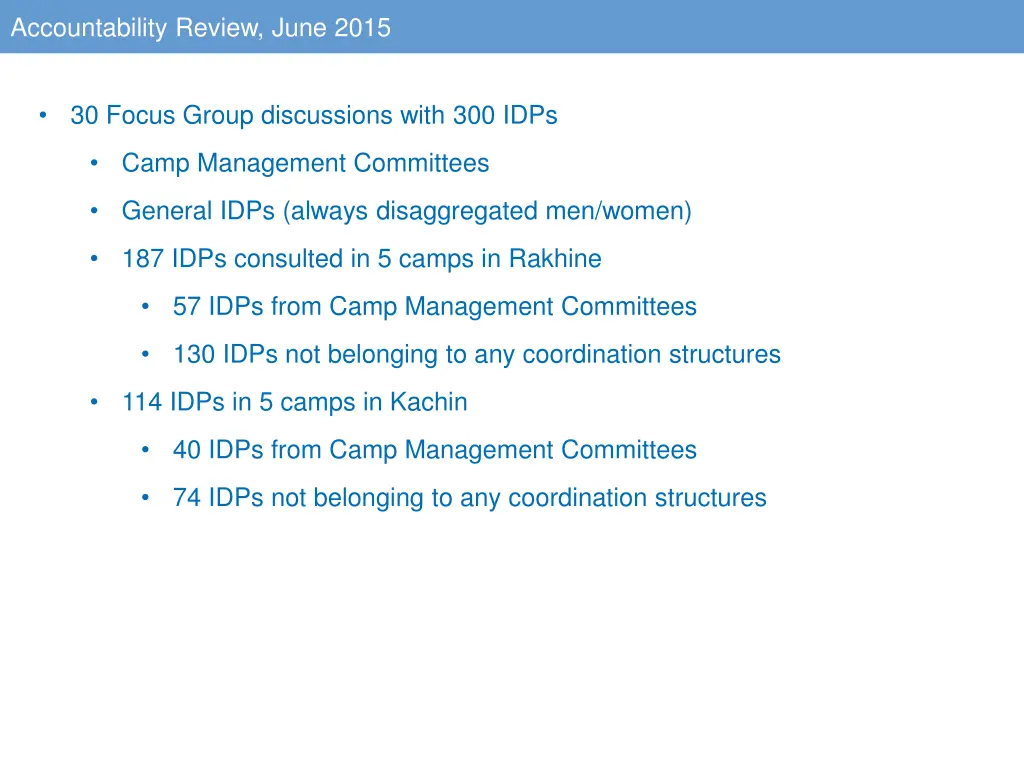
Accountability Review June 2015: Insights from IDP Camps in Rakhine
Discover key findings from the June 2015 Accountability Review in Rakhine, including perspectives on humanitarian response, agency effectiveness, relationships with organizations, and information dissemination among internally displaced persons (IDPs). Explore detailed data collected from focus group discussions to better understand these critical aspects.
Download Presentation

Please find below an Image/Link to download the presentation.
The content on the website is provided AS IS for your information and personal use only. It may not be sold, licensed, or shared on other websites without obtaining consent from the author. If you encounter any issues during the download, it is possible that the publisher has removed the file from their server.
You are allowed to download the files provided on this website for personal or commercial use, subject to the condition that they are used lawfully. All files are the property of their respective owners.
The content on the website is provided AS IS for your information and personal use only. It may not be sold, licensed, or shared on other websites without obtaining consent from the author.
E N D
Presentation Transcript
Accountability Review, June 2015 30 Focus Group discussions with 300 IDPs Camp Management Committees General IDPs (always disaggregated men/women) 187 IDPs consulted in 5 camps in Rakhine 57 IDPs from Camp Management Committees 130 IDPs not belonging to any coordination structures 114 IDPs in 5 camps in Kachin 40 IDPs from Camp Management Committees 74 IDPs not belonging to any coordination structures
Rakhine: Accountability Review, June 2015 Q1 - DO HUMANITARIAN AGENCIES RESPOND TO THE MOST URGENT NEEDS IN YOUR COMMUNITY? Possible answers: There s no humanitarian response in our community The humanitarian response that takes place is insufficient and does not respond to our priorities The humanitarian response responds to our priorities but is insufficient in quantity The humanitarian response is sufficient and responds to our priorities Women 12 22 23 12 Men 5 14 25 7 0% 10% 20% 30% 40% 50% 60% 70% 80% 90% 100%
Rakhine: Accountability Review, June 2015 Q2 - HOW DO YOU JUDGE THE ABILITY OF HUMANITARIAN AGENCIES TO MEET THE NEEDS OF THE MOST VULNERABLE IN YOUR COMMUNITY? Possible answers: The most vulnerable are not consulted and do not have access to the assistance given The most vulnerable are not consulted but have access to the assistance in the same way as other members of the community The most vulnerable are consulted but do not receive any special treatment The most vulnerable are consulted and their special needs are taken into account in the assistance provided Women 25 13 15 13 Men 10 7 20 14 0% 10% 20% 30% 40% 50% 60% 70% 80% 90% 100%
Rakhine: Accountability Review, June 2015 Q3 - HOW DO YOU JUDGE THE QUALITY OF THE RELATIONSHIP WITH ORGANISATIONS THAT WORK IN YOUR COMMUNITY? Possible answers: Promises are not kept. Communication is bad. Activities eventually take place, but in an unpredictable way There s regular and respectful communication, and promises are kept We feel listened to and respected. All decisions that have been taken are explained to us Women 5 32 9 19 Men 23 10 8 10 0% 10% 20% 30% 40% 50% 60% 70% 80% 90% 100%
Rakhine: Accountability Review, June 2015 Q4 - WHAT LEVEL OF INFORMATION HAVE YOU RECEIVED ABOUT THE HUMANITARIAN AGENCIES AND THEIR ACTIVITIES IN YOUR COMMUNITY? Possible answers: I have no information about the aid organizations working here and their activities I ve received some information about the aid organizations and their activities I ve received all necessary information about the programmes from the aid organizations I ve received all necessary information about the organizations, their programmes and the budget of their activities Women 5 23 7 35 Men 14 12 18 7 0% 10% 20% 30% 40% 50% 60% 70% 80% 90% 100%
Rakhine: Accountability Review, June 2015 Q5 - WHAT DEGREE OF PARTICIPATION HAVE YOU EXPERIENCED WITH HUMANITARIAN PROGRAMMES IN YOUR COMMUNITY? Possible answers: Ignored. The activities are planned and implemented without us being informed or consulted. Informed, but not involved. They tell us what has been decided and how the project will affect us. Consulted. The organization asks our opinion about the planning and implementation of projects and informs us of the decisions that have been taken. Involved: Our voice counts in the planning, implementation and evaluation of projects. Women 14 23 15 14 Men 19 27 4 1 0% 10% 20% 30% 40% 50% 60% 70% 80% 90% 100%
Rakhine: Accountability Review, June 2015 Q6 - HOW DO YOU RAISE PROBLEMS WITH ORGANISATIONS THAT WORK IN YOUR COMMUNITY? Possible answers: We do not have any possibility to communicate our complaints. We can complain, but we never receive a detailed response. Organizations have explained to us how to raise complaints or problems, and complainants receive a response most of the time. There s a system for complaints handling. Those who file a complaint get a response quickly, and actions are taken to resolve the issue. Women 8 12 19 21 Men 16 24 4 7 0% 10% 20% 30% 40% 50% 60% 70% 80% 90% 100%
Kachin: Accountability Review, June 2015 Q1 - DO HUMANITARIAN AGENCIES RESPOND TO THE MOST URGENT NEEDS IN YOUR COMMUNITY? Possible answers: There s no humanitarian response in our community The humanitarian response that takes place is insufficient and does not respond to our priorities The humanitarian response responds to our priorities but is insufficient in quantity The humanitarian response is sufficient and responds to our priorities Women 0 8 36 0 Men 0 4 21 5 0% 10% 20% 30% 40% 50% 60% 70% 80% 90% 100%
Kachin: Accountability Review, June 2015 Q2 - HOW DO YOU JUDGE THE ABILITY OF HUMANITARIAN AGENCIES TO MEET THE NEEDS OF THE MOST VULNERABLE IN YOUR COMMUNITY? Possible answers: The most vulnerable are not consulted and do not have access to the assistance given The most vulnerable are not consulted but have access to the assistance in the same way as other members of the community The most vulnerable are consulted but do not receive any special treatment The most vulnerable are consulted and their special needs are taken into account in the assistance provided Women 5 14 22 4 Men 0 11 16 3 0% 10% 20% 30% 40% 50% 60% 70% 80% 90% 100%
Kachin: Accountability Review, June 2015 Q3 - HOW DO YOU JUDGE THE QUALITY OF THE RELATIONSHIP WITH ORGANISATIONS THAT WORK IN YOUR COMMUNITY? Possible answers: Promises are not kept. Communication is bad. Activities eventually take place, but in an unpredictable way There s regular and respectful communication, and promises are kept We feel listened to and respected. All decisions that have been taken are explained to us Women 0 9 23 12 Men 0 5 13 12 0% 10% 20% 30% 40% 50% 60% 70% 80% 90% 100%
Kachin: Accountability Review, June 2015 Q4 - WHAT LEVEL OF INFORMATION HAVE YOU RECEIVED ABOUT THE HUMANITARIAN AGENCIES AND THEIR ACTIVITIES IN YOUR COMMUNITY? Possible answers: I have no information about the aid organizations working here and their activities I ve received some information about the aid organizations and their activities I ve received all necessary information about the programmes from the aid organizations I ve received all necessary information about the organizations, their programmes and the budget of their activities Women 0 19 19 7 Men 1 14 12 3 0% 10% 20% 30% 40% 50% 60% 70% 80% 90% 100%
Kachin: Accountability Review, June 2015 Q5 - WHAT DEGREE OF PARTICIPATION HAVE YOU EXPERIENCED WITH HUMANITARIAN PROGRAMMES IN YOUR COMMUNITY? Possible answers: Ignored. The activities are planned and implemented without us being informed or consulted. Informed, but not involved. They tell us what has been decided and how the project will affect us. Consulted. The organization asks our opinion about the planning and implementation of projects and informs us of the decisions that have been taken. Involved: Our voice counts in the planning, implementation and evaluation of projects. Women 0 8 19 18 Men 0 5 15 10 0% 10% 20% 30% 40% 50% 60% 70% 80% 90% 100%
Kachin: Accountability Review, June 2015 Q6 - HOW DO YOU RAISE PROBLEMS WITH ORGANISATIONS THAT WORK IN YOUR COMMUNITY? Possible answers: We do not have any possibility to communicate our complaints. We can complain, but we never receive a detailed response. Organizations have explained to us how to raise complaints or problems, and complainants receive a response most of the time. There s a system for complaints handling. Those who file a complaint get a response quickly, and actions are taken to resolve the issue. Women 0 5 30 9 Men 0 3 17 10 0% 10% 20% 30% 40% 50% 60% 70% 80% 90% 100%

